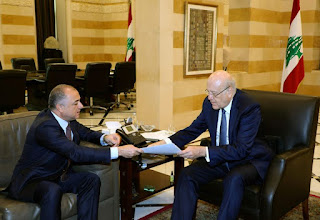Aoun’s Historic Maritime Deal with Israel
Photo source: Gulf News
By Naveed Qazi | Editor, Globe Upfront
Israel and Lebanon are still technically at war, but an American-mediated deal for their maritime operations has been reached permanently. It aims to cease the future conflict. The deal was struck days before the Israeli election in October 2022. The debate regarding it had been highly politicised, with some questioning its motives and timing.
The deal was signed in restrained ceremonies in the respective countries. The occasion provided a rare occasion of harmony, but it also showed some limitations, as the Lebanese government believes that it is far less momentous than agreements reached between Israel and three Arab states in 2020, or Israel’s earlier peace treaties with Egypt and Jordan. It signals that Lebanon is certainly a bit conservative and realistic about it. But, in Israel, the deal, in general, is regarded as a historic achievement that will bring prosperity, and stability, or as a fall of Hezbollah’s threats, which fought wars with Israel in 2006 that resulted in killing of fifteen hundred people.
Before the deal, Hezbollah had vowed to cease any effort that seeks to drill an underwater gas field, Karish, near the disputed waters. In early 2022, Israel shot several drones that Hezbollah had send, as a warning toward a rig at the Karish site, fuelling escalations.
After the deal, Hassan Nasrallah indicated in a press briefing that he was standing down on the gas issue. One of Hezbollah’s spokesmen revealed that they were no longer preparing for an imminent war. It was something that goes against their charter because it recognises Israel as an entity and not a state.
The maritime deal allocates drilling rights to Lebanon at one contested gas field, Qana, which straddles the two economic zones and confirms Israeli control of the Karish field on the Israeli side to the south.
Supporters of the deal argue that it removes the threat of immediate conflict with Hezbollah over the gas reserves. After the drafting, Lebanon could potentially reduce its dependence on Iranian oil as well.
For Sarit Zehavi, a former military officer in the intelligence corps described it as a deal yielding to the Lebanese position, asserting that it will postpone the next conflict. Amidror, a fellow of the conservative-leaning Jerusalem Institute for Strategy and Security and the Washington-based Jewish Institute for National Security of America has even concluded that the maritime deal would be good for Israel economically, but bad strategically.
Gas production has already begun from the Karish platform. Israel will also receive seventeen per cent of any future profits from the Lebanese Qana field, showing that Israel has an upper hand when it comes to boundaries. The royalties are to be paid by the French company prospecting there, as Lebanon rejected paying Israel directly.
‘In addition to abandoning claims to Karish, Lebanon also seems to have dropped claims to a small safe zone that was owned and manned by Lebanese authorities,’ claims Gulf News. It includes the area near the shore at Naqoura, extending around five kilometres out to the sea before it ties back to Line 23, which Israel has conceded to Lebanon.
In September 2022, however, Israel rejected the idea of a safe zone, ascertaining that it would put the northmost city of Nahariya at the mercy of Hezbollah fire. They suggested placing the would-be safe zone under the auspices of the United Nations, but that would require amending Unifil’s current mandate, which applies to ground territory only and not to territorial waters.
The arrival of a new gas supply in the Mediterranean, nevertheless, is timely for Europe as it continues efforts to reduce its reliance on Russian supplies.
From the deal, Aoun also had certain things to prove. He wanted to show the regional politicians that he is a problem solver and that he was the man in charge of negotiations and not Parliament Speaker Nabih Berri, who had initiated talks over Lebanon’s maritime borders in 2011. Aoun claimed that the talks fell under his jurisdiction, based on Article 52 of the Lebanese Constitution. Since then, however, he has found himself increasingly left out of the process, both by the Americans, Berri, and ironically, Hezbollah.
Aoun also wanted to have the final say on the disputed area, because it would have given him leverage with the US as he was trying to arrange the succession of his son-in-law and heir apparent, Gibran Bassil. Thus, he hopes that Bassil would succeed him as president when his term ends. That’s why he tried trading the disputed territory in exchange for US endorsement for his son-in-law’s presidential bid.
Before the deal, Netanyahu had criticised Lapid’s decision for its affirmation. He accused him of spreading terrorism, and that the money generated from the deal would go to Hezbollah’s coffers. Lapid, in reply, called his comments ‘irresponsible’ and that talks with Lebanon have been ‘very complex’ until now.




Comments
Post a Comment
Advice from the Editor: Please refrain from slander, defamation or any kind of libel in the comments section.